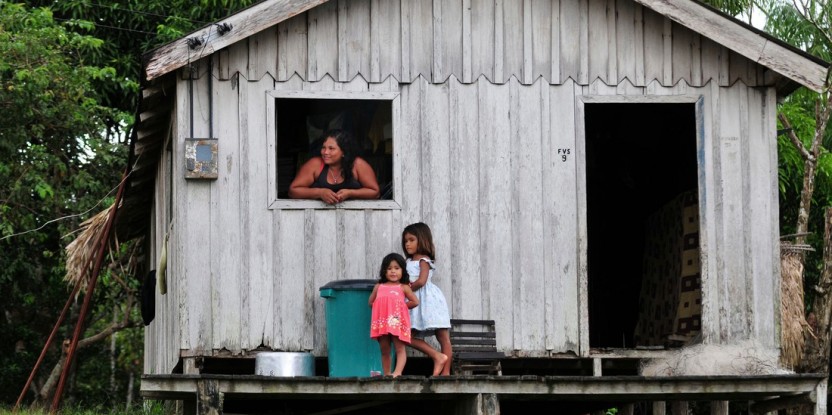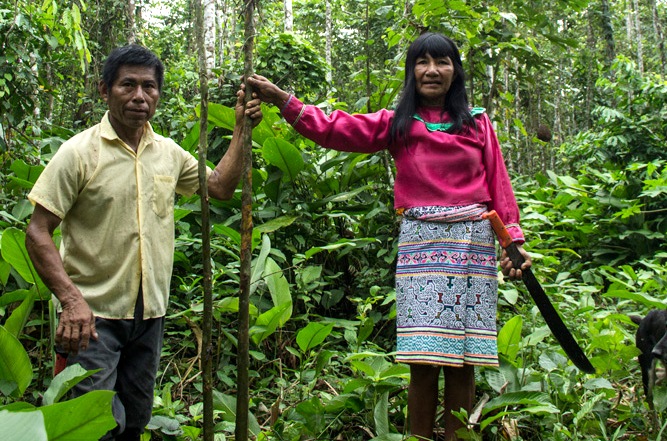
Holding formal individual property rights is widely seen as a boon for reducing poverty, conflict and environmental degradation.
But in parts of the Amazon, an individual land title may not provide as much security as widely assumed, and social relationships can have more power than a piece of paper.
These are some of the findings of a study that compared collective and individual land titling in Peru and Ecuador and their effects on tenure security, conducted by the Center for International Forestry Research (CIFOR).
Establishing clear and secure tenure for forest-dwelling communities is viewed as essential for protecting livelihoods and rights, and also for achieving environmental goals.
But how tenure can or should be secured remains unclear.
“The driving paradigm is still that private, individual property is more secure,” said CIFOR’s Anne Larson, one of the study’s co-authors.
“But the idea that we can increase tenure security if we can just get everyone titled – we found it to be much more complicated. There are other things people turn to for their own sense of tenure security.”
PRIVATE PROPERTY PARADISE … LOST?
The study focused on 21 indigenous and mestizo communities in Ecuador’s Napo Province and in the Ucayali and Huánuco regions of Peru. The communities chosen varied in terms of both ethnicity and the type of landscape in which they lived.
What was surprising was the overwhelming sense of the importance of collective action, even in individually titled lands
“We found that most property consisted of dynamic mosaics of different kinds of rights, including informal and formal, as well as individual and collective,” said study co-author Peter Cronkleton.
“Yet surprisingly, responses across all these areas tended to be similar.”
Three dominant aspects emerged as determining the security of land tenure, regardless of whether ownership arrangements were formal or informal.
The first was some kind of legal document – usually a title, but not always. The second was demonstrated use of the land: if you are not living on and actively managing your land, it’s likely someone else will claim it. Third was your relationship with your neighbors and the community as a whole.
“We weren’t particularly surprised to find individual lands within collective areas, but what was surprising was the overwhelming sense of the importance of collective action, even in individually titled lands,” Larson said.
One reason might be that some groups, especially indigenous communities, fear that the state won’t defend their titles if challenged. Often, it is the community, rather than government, that is called on to settle disputes about individual titles, Cronkleton notes.
“In places where governance is weak and there is little state presence, collective rights and processes are important for establishing rules that are seen as locally legitimate,” Cronkleton said.
“But people also want individual rights to ensure they benefit from their hard work and investments in their land.”
NO CLEAR WINNER
The study reveals pros and cons of both individual and collective titling.
Holding an individual title, for example, makes it easier to get a loan.
“Often the state still maintains a bias toward private individual holders, which makes it difficult to do something different or new,” Larson said. “It may be hard, or even impossible, to get credit if you only have a collective title.”
But collective titling also has advantages.
“Collective title is often one thing that really holds the community together and keeps the traditions going,” Larson said.
“The collective allows the group to resist market pressure to convert all forest to something else because you have a tradition and other reasons to keep that forest standing.”
The study’s findings thus challenge the idea that issuing individual property titles is necessarily better for people living in the forest.
“The findings continue to offer some of the arguments against romanticizing individual titling,” Larson said.
(IN)FORMALLY YOURS
Having seen how titling is done in practice, Larson was struck by how tentative land titles really are.
“A title can simply be a piece of paper that won’t stop someone else from taking your land and your title, because they are more powerful,” she said.
“A title may or may not increase your security in a specific situation.”
And even where it does mean more security, it’s not always permanent.
“Between the time you walk into a community and start doing your demarcating and the time you hand out those titles, you already have people who don’t fit,” she said.
Furthermore, Cronkleton stresses, land rights are always in flux. Which means that holding a title is no guarantee the owner will have the flexibility to deal with changing circumstances.
“There are legitimate reasons why people would want to divide property, transfer it to heirs, or sell it to move, but in many places the required legal transactions are complex, costly or even impossible,” he said.
“In the absence of simple and clear governance institutions for government to establish a fair playing field, people continue to rely on informal institutions.”
This research was funded by USAID, with support from GIZ.
We want you to share Forests News content, which is licensed under Creative Commons Attribution-NonCommercial-ShareAlike 4.0 International (CC BY-NC-SA 4.0). This means you are free to redistribute our material for non-commercial purposes. All we ask is that you give Forests News appropriate credit and link to the original Forests News content, indicate if changes were made, and distribute your contributions under the same Creative Commons license. You must notify Forests News if you repost, reprint or reuse our materials by contacting forestsnews@cifor-icraf.org.

